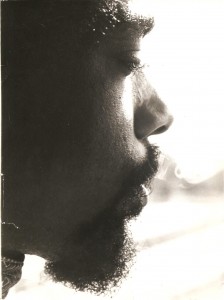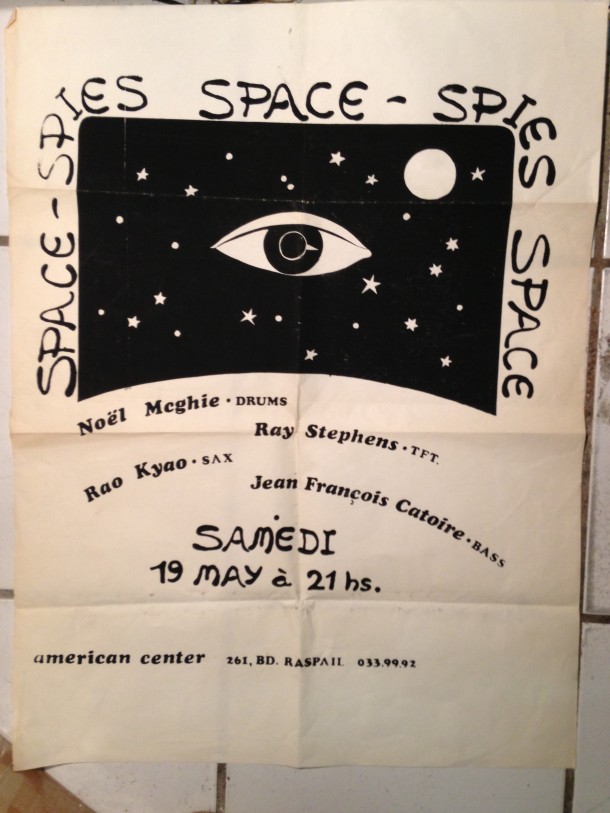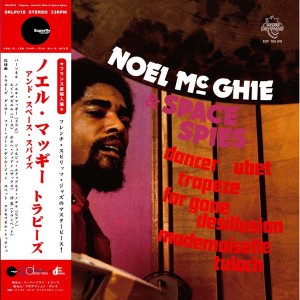



Photo by Alain Mingam
With the reissue of his first and only LP so far and the recording of a second LP (40 years later!) in the pipeline, the legendary drummer drops by the Superfly shop for a quick chat!
Your were born in Jamaica, and stayed in touch with community when you moved to UK in 1962. Is it an aspect important in your career?
I stayed in the community because I had no alternative, dont forget i was only 18 years old… Yes it is, if I had not left Jamaica I would not have felt the urge to become a professional musician.
Is that why you had recorded for Esperance label, with some west-Indies musicians?
I recorded for Disc-Espérance because that was the label which offered the opportunity to record the music that I wanted to at that time! The musicians were the ones with whom I had started the group Space Spies, not only west-indies musicians but also one Portuguese and one Japanese Musician in the Group.
Why did you decide to play the drums?
I play the drums because I was born to play the drums.
You mentioned Rashied Ali as an important reference. Who were your mentors as drummers? and why?
Apart from Rashied Ali, there are also Cozy Cole, Kenny Clark, Philly Joe Jones, Roy Haynes, Max Roach, Milford Graves and many many more. Too many to mention here!
“Trapeze”
After studying music, you decided to move and live in Paris…
At the age of 11 in Jamaica, I decided – thanks to M. Maurice Chevalier – that France would be the only country that i would want to go to if and when I chose to leave Jamaica. So after London, I decided to come here. I started to study music so as to have something to offer when I eventually got here .
How was the French scene at this period? Where did you play?
The French musical scene was open, alive and welcoming. I started to work at once with François Tusques. We played everywhere, in MJC (Maison des Jeunes et de la Culture), university campuses, clubs…
In Paris, you became one of these totemic drummers of the free jazz scene, playing and recording with Francois Tusques, Steve Lacy, Archie Shepp, Anthony Braxton or Bobby Few. And also a member of french protest singer Colette Magny’s band. Nevertheless, you still are one of those unsung heroes. How could you explain it?
This question is not important : what is really important is that I am still alive and replying to this interview. Thank you very much!
In 1975, you published your first and only album. Why did you choose this title ‘Trapeze’ ? And, actually, was it well received by jazz critics and public?
This is a great question. The title ‘Trapeze’ is in to the Circus where the artists placed their lives in great danger, in great danger swinging high above the ground with rhythm and coordination. I was not and i am still not impressed by the critics as for the public, we were in direct competition with Miles at that time, Miles won of course.

With Colette Magny (“Repression”)
Where did you record that ? How was the record sessions’ moods ?
We recorded at Studio Washington in XVIeme arrondissement in Paris. It took a day (8 hours.) We were well prepared, hours of repetitions, but it was what we called a live recording session : no play backs, not more than two takes per track. The mood was great, the musicians were confident and there was no stress. I recorded the music that I sincerely believed people would enjoy, and the fact that it is being re-distributed for the third time proves somehow that I was right.
After that, you never recorded under your name, but toured and played with many musicians, from Miriam Makeba to François Tusques. Was it your choice ? How could you explain it ?
They called me, I never sought them out… I did record, a 45’s in 1984 for 4 Aces label, an independent label started by Barney Wilen and his wife, which was an attempt at some reggae (one song) which never got off the ground ! More seriously I never recorded album because I did not have anything that I thought worth-while after ‘Trapeze’.
In 1971, you came to France in order to study percussions at conservatory. In 1980’s, you became teacher at IACP, Alan Silva’s Parisian school. What did you learn in France? and what did you teach to younger fellows?
I decided classical percussion and piano in order to advance my musical capacities, I also studied at the Agostini Drum School started by Kenny Clarke and Dante Agostini in the late 60’s, which prepared me to qualify as a teacher at IACP. I taught my “solfege”, interpretation, technique, discipline, improvisation.
“Dancer”
Forty years after his first release, Noel McGhie & Space Spies LP is coming back in front, through his first vinyl reissue and after a CD reissue by Jazzin in 2003. Is it like a renaissance ?
Some producers have good taste and the public is still attracted to this album!
And will we have the luck to listen there repertory on stage?
No. I won’t be performing the whole Space-Spies repertory on stage. Just two titles re-worked that will be included on my next album
Finally, there are rumors about this second album, focusing on your Jamaican roots. Could you tell us more about that?
I have decided to re-visit my African-West-Indian musical heritage and I am currently preparing the above mentioned album with this aim. I would rather not talk about that. Let’s just wait and see how and if that will turn out.

“For Gone Desillusion”